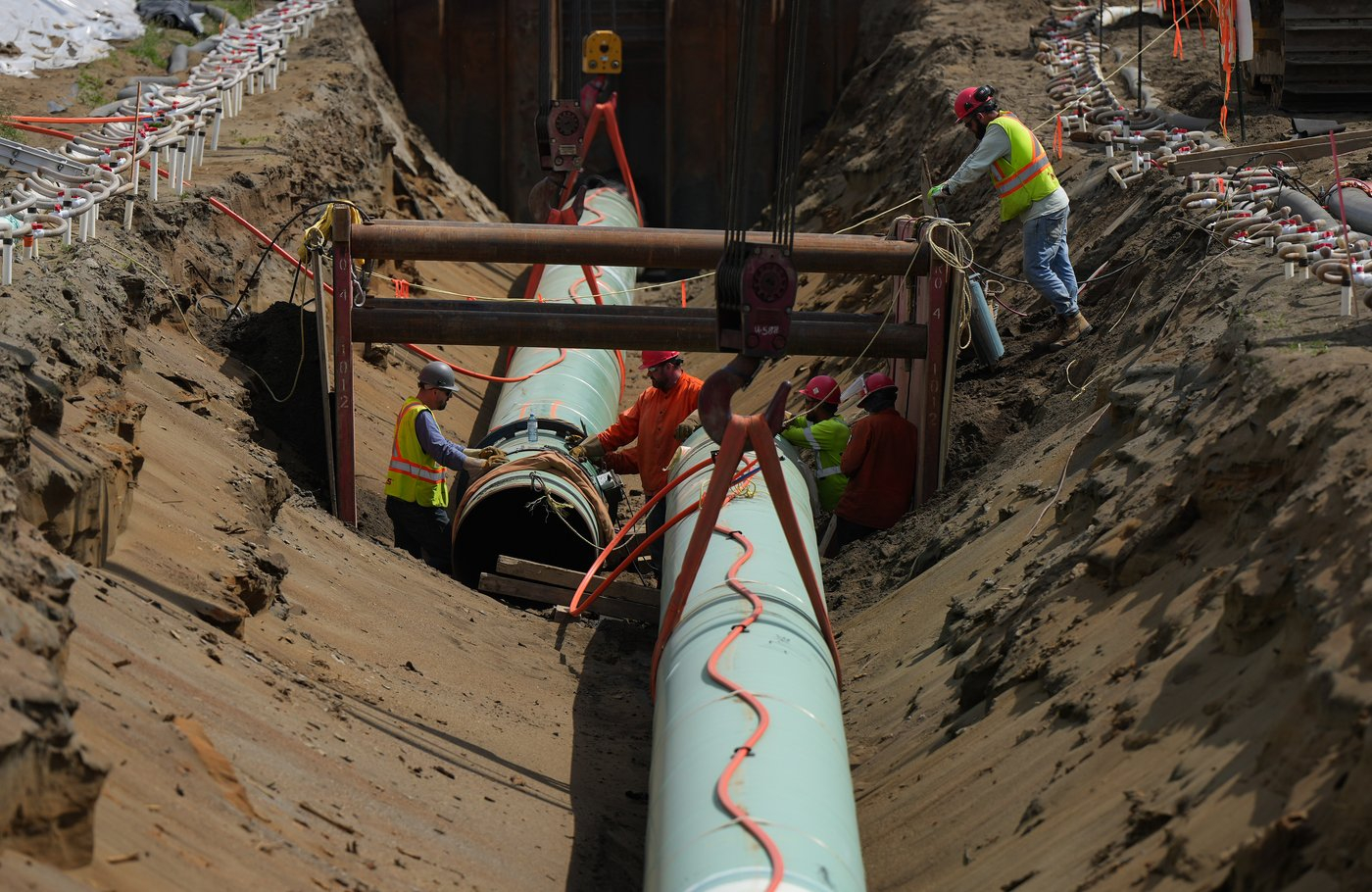The Trans Mountain pipeline expansion is facing delay yet again.
The Crown corporation building the massive project, which had previously stated it expected to have the pipeline in-service near the end of the first quarter, said Monday it has once again run into construction challenges in B.C. and pushed that date back
In a statement on its website, Trans Mountain Corp. said Monday it has encountered "technical issues" and needs additional time to determine the "safest and most prudent actions for minimizing further delay."
The company said the technical issues were discovered between Jan. 25 and Jan. 27 during construction work in the Fraser Valley between Hope and Chilliwack, B.C.
"Trans Mountain is fully focused on the completion of the pipeline and will not be providing (media) interviews at this time as it works towards the anticipated in-service date in the second quarter of 2024," the company stated.
The Trans Mountain pipeline is Canada's only oil pipeline to the West Coast and its expansion will increase the pipeline's capacity to 890,000 barrels per day from 300,000 bpd currently.
Its construction, which is more than 98 per cent complete, has been underway for more than three years. Canadian oil producers have already begun ramping up production in expectation of the additional export capacity, which is expected to improve the prices Canadian oil companies receive.
But Trans Mountain Corp. has been racing against the clock as it deals with difficulties drilling through hard rock in B.C.
Its initial request to use a different size of pipe for the location in question was denied by the Canada Energy Regulator due to concerns around pipeline quality and integrity.
Trans Mountain Corp. then asked the regulator to reconsider, saying in December that the project could face a worst-case scenario of a two-year delay in completion if it was not allowed to alter its construction plans.
After an oral hearing in Calgary earlier this month, the regulator then agreed to allow a pipeline variance, as long as Trans Mountain Corp. abided by a number of conditions, including testing and documentation requirements for the pipe materials.
"We had a timeline in sight, and we were so close, only to now be disappointed. And I think that's been the narrative of this project from the beginning," said Raymond James analyst Jeremy McCrea in an interview on Monday.
"If we can come out with a Q2 startup, great, but I think now there's going to be a lot of skepticism. Is that date going to be pushed out again?"
McCrea said a significant delay would likely widen the Western Canada Select differential, a term for the discount Canadian oil producers typically take on their product due to in part to lack of export capacity.
That differential has been narrowing in recent weeks in anticipation of the pipeline expansion opening, but a glut of oil with nowhere to go will widen it again and hurt Canadian oil producers' profits in the short-term, McCrea said.
In the longer term, the difficulties Trans Mountain Corp. has experienced getting its project over the finish line harm Canada's reputation as an investment destination, he added.
"It just doesn't look good for us as a country when we constantly have these delays and cost overruns," McCrea said.
"In terms of any foreign capital looking to come into the country, in terms of building mega-projects, this is a black eye for Canada."
The Trans Mountain pipeline is owned by the federal government, which purchased it in 2018 in an effort to get the expansion project over the finish line after it was scuttled by previous owner Kinder Morgan Canada.
The project's costs have spiralled through the course of construction from an original estimate of $5.4 billion to the most recent estimate of $30.9 billion.
Trans Mountain Corp. has blamed the ballooning costs on a number of things, including evolving compliance requirements, Indigenous accommodations, stakeholder engagement and compensation requirements, extreme weather, the COVID-19 pandemic and challenging terrain.
This report by The Canadian Press was first published Jan. 29, 2024.
So what are these technical
So what are these technical issues? The job of a good reporter is to find out what the company does not want us to know. In this respect this particular reporter leaves us wanting, both now and in the past.
Two possibilities I am aware of:
- At the last public hearing TM was asked if there were geotechnical issues at the tunnel entrance and exit where ‘traps’ are to be installed for ‘pigs’ to inspect the pipeline. The answer was yes, but the Commission did not ask for further information.
- According to the chart of pipeline diameter and length, the current plan to haul a 30” pipe through a 42” hole for 2,300 metres is not a slam dunk, but could present problems. If it were to get irretrievably stuck, then what?
"It just doesn't look good
"It just doesn't look good for us as a country when we constantly have these delays and cost overruns," McCrea said.
So sad, poor, poor, poor oil company having problems getting its way?
It doesn't look good for us as a country what we constantly have these dirty energy corporations lying and deceiving the public, from the initial $5.4 to $30.9, is what anyone would call incompetence or dishonesty.
Con the public with a impossible low number to build, then raise the price up five times that, to get to the true actual cost. This is a total abuse of public money and environment but as usual, blame those who didn't roll over for you in your quest for profits over human rights, Indigenous rights and the environment,
Look no further than Trans Mountain, for example. A new analysis, produced by independent economist Robyn Allan and published by West Coast Environmental Law, found taxpayers are likely to eat a staggering $17 billion in debt from the government-owned pipeline expansion project (TMX). Ottawa is obscuring the true cost of TMX through a confusing corporate structure and “accounting wizardry,” Allan argues.





Comments